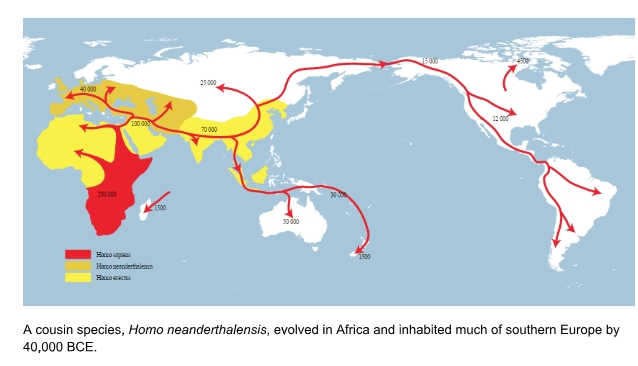In the context of current immigration issues, my Indian friend Babi brought up the subjects of land-grabbing and prejudice. Babi was my associate, Black & Decker’s polymer expert, and became a naturalized citizen of the United States more than forty years ago. Today he feels less welcome in our country than before. He is worried, despite my attempt to allay his fear, that he could be deported.
Why does he feel unwelcome? I will begin with a little history of humankind.
Almost two million years ago, our ancestor, Homo erectus evolved in East Africa, and by 750,000 BCE had emigrated through the Middle East and mostly eastward through India to Indonesia (Java man fossil), China (Peking man fossil), and Korea. See migration map:
Our species, Homo sapiens, also evolved in Africa (about 200,000 BCE), and started migrating around the world. By 15,000 BCE sapiens crossed the land bridge at the Bering Strait, and by 10,000 BCE had made it all the way to the southern tip of South America.
Anthropologists are unsure of the means by which later species replaced earlier ones, but four components may be 1) later species were better adapted to changing environments, 2) our species developed complex, symbolic language, i.e. communication skill, 3) Homo sapiens was better organized in hunting and combat, which led to 4) we wiped out earlier species we encountered. It was probably a combination of these.
As our species expanded we pushed aside or destroyed competitors in our endeavor to dominate territories of the world (land grabbing). The destruction and replacement occurred fastest when invaders possessed vastly superior weapons technology. Axiom #1 of our species has been MIGHT MAKES RIGHT.
As American settlers expanded westward, we justified our right to Native American lands by saying it was our “manifest destiny” to bring the benefits of civilization to these “savages.” A similar rationale was employed for black African slaves we brought to our country. They were better off here, we said, as slaves than in the wilds of Africa. Besides, they weren’t really equals as people. Bottom line: we took those people captive and used them as slaves not because we should, but because we could.
Later, the South claimed that the Bible supported their slave-holding policy. This follows Axiom #2 of our species: GOD DEGREES IT. We are only doing what God wants. But who authored and interpreted that scriptural guidance? Men who needed justification for what they wanted to do.
Prejudice follows from Axiom #3 of our species: MY TRIBE IS THE BEST. Tribalism arises from differences in race, economic status (e.g. caste in India, net worth in USA), religious belief, political persuasion, culture, vocation, nationalism, age, sexual orientation, physical stature, mental ability, gender, and more. The tribe to which I belong is superior to your tribe.
Now to racial prejudice. Is it justified?
A reason why racial prejudice prevails is because one can notice visually that the other is different. He doesn’t look like me. His skin is darker, his lips are thicker or thinner, his hair is blacker or kinkier, his eyelids are less pronounced and the wrong shape. Physical differences make it easier to identify those who are different than your particular tribe.
But are visual differences worthy of prejudice? Consider the genetics.
All people today are the same species. Species is a basic unit of Taxonomy, a system of classification of living things. Using man as an example, the ladder of classification, proceeding from broadest to most narrow, is:
Domain – Eukaryota (cells containing nuclei)
Kingdom – Animalia (Animal)
Phylum – Chordata (Chordate)
Class – Mammalia (Mammal)
Order – Primates
Family – Hominidae
Genus – Homo (man)
Species – Sapiens (wise)
Sub-species – None (there are no sub-species of man)
There are, however, differences in alleles (pronounced uh-LEELS). Alleles are variations of specific genes that result in observable phenotypic (outwardly observable) traits such as eye color, hair color and texture, certain facial features, and the amount of melanocytes (melanin-producing cells) in the skin. These features are akin to color variation in the same species of flower (e.g. roses), and are differences so superficial that they do not warrant classification by taxonomists (or biologists); they are important only to bigots and racists.
The prejudice in our country is mainly skin-color based, especially if dark skin is accompanied by facial features typical of black Africans. But what makes skin dark? A dark-skinned person has more melanocytes in the basal layer of his skin. Melanin is able to dissipate almost 100% of harmful UV radiation that is mostly responsible for skin cancers like malignant melanoma. A high concentration of melanin provides a genetic advantage for people who spend a lot of time in the sun. People who don’t spend a lot of time in the sun do not need as much melanin pigmentation. When man migrated to non-tropical regions he needed less melanin in his skin. He became lighter-skinned. Evolution at work.
There is no biological advantage for lighter skin, and one big disadvantage (less UV protection). So it seems ridiculous for lighter-skinned people to view darker-skinned people inferior. Yet that is what many whites do. Go figure! That prejudice appears to be just another form of tribalism, an even greater divisive force than our current president.
In broader context, prejudice is pre-judging a person not on individual merit, but on ideas one has about the group to which that person belongs. Wouldn’t it be more just to access a person’s worthiness from personal interaction? An exception to this principle would be if the individual in question follows an ideology with an avowed goal of harming non-threatening people who do not belong to his group (e.g. ISIS).
I will finish by adding one more axiom that I think is sometimes right and sometimes wrong: ENDS JUSTIFY MEANS. Example: some Trump supporters consider him means to an end, but at what cost to the norms and ethics of our democracy?
Bob Moores retired from Black & Decker/DeWalt in 1999 after 36 years. He was the Director of Cordless Product Development at the time. He holds a mechanical engineering degree from Johns Hopkins University.




Write a Letter to the Editor on this Article
We encourage readers to offer their point of view on this article by submitting the following form. Editing is sometimes necessary and is done at the discretion of the editorial staff.